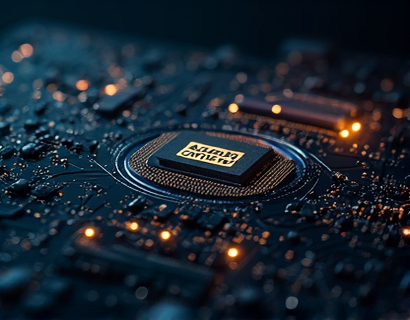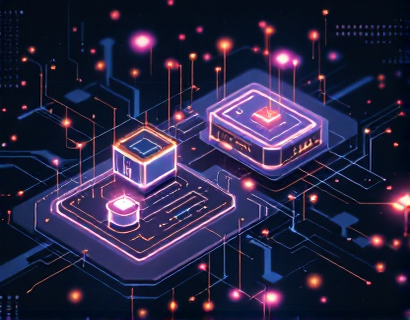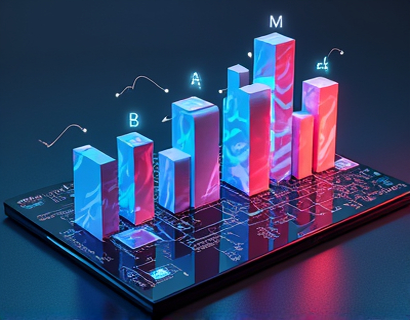Blockchain Oracle Management: Streamlining Data Integration and Enhancing Smart Contracts for Decentralized Applications
In the rapidly evolving landscape of blockchain technology, the role of oracles emerges as a critical component for connecting decentralized applications (DApps) with external data sources. Oracles serve as bridges, providing real-time data and enabling smart contracts to interact with the off-chain world. However, managing these oracles efficiently remains a challenge for developers and businesses aiming to harness the full potential of blockchain. This article delves into advanced software solutions that revolutionize oracle management and blockchain service access, focusing on optimizing data integration and enhancing smart contract capabilities. By doing so, it aims to ensure secure and reliable interactions within DApps, unlocking the true potential of blockchain technology through advanced management and seamless service access.
Understanding the Role of Oracles in Blockchain Ecosystems
Oracles play a pivotal role in the blockchain ecosystem by facilitating the flow of information between the blockchain and external systems. They collect data from various sources, such as IoT devices, APIs, and traditional databases, and relay this data to smart contracts on the blockchain. This data can include price information, sensor readings, or any other relevant data points necessary for the operation of DApps. Without reliable oracles, smart contracts would lack the external data needed to execute complex logic and make informed decisions.
The importance of oracles is underscored by their impact on the functionality and trustworthiness of DApps. For instance, in decentralized finance (DeFi) applications, oracles provide price feeds that are crucial for automated trading and lending protocols. In supply chain management, oracles can track the movement of goods and ensure transparency and accuracy in transactions. However, the reliance on external data sources introduces vulnerabilities, such as data latency, accuracy issues, and security risks. These challenges necessitate robust solutions for oracle management to ensure the seamless operation of DApps.
Challenges in Traditional Oracle Management
Traditional oracle management approaches often struggle with several key issues. One major challenge is data latency, where there is a significant delay between data collection and its availability to smart contracts. This delay can render the data obsolete, leading to incorrect decisions and potential losses for users. Another issue is data accuracy, as oracles may provide incorrect or manipulated data, compromising the integrity of the DApp. Security is also a paramount concern, as oracles can become targets for attacks, exposing sensitive information and disrupting service.
Furthermore, the decentralized nature of blockchain introduces complexity in managing multiple oracles. Developers must ensure that data from various sources is aggregated and validated correctly, which requires sophisticated algorithms and protocols. The lack of standardization across different blockchain platforms adds another layer of complexity, making it difficult to create universally compatible oracle solutions. These challenges highlight the need for advanced software solutions that can address these issues and streamline oracle management.
Advanced Software Solutions for Oracle Management
To overcome the challenges associated with traditional oracle management, innovative software solutions have emerged. These platforms focus on optimizing data integration, enhancing smart contract functionality, and ensuring secure and reliable interactions. One such solution is a decentralized oracle network that leverages a network of trustworthy nodes to collect and validate data. By distributing the data collection process across multiple nodes, the network reduces the risk of single points of failure and enhances data accuracy.
These platforms employ advanced cryptographic techniques to ensure the integrity and authenticity of the data provided to smart contracts. For example, they use zero-knowledge proofs to verify data without revealing sensitive information, thereby maintaining user privacy and security. Additionally, machine learning algorithms can be integrated to detect and mitigate anomalies in data feeds, further enhancing the reliability of the oracle network.
Another key feature of these advanced solutions is their ability to aggregate data from multiple sources and provide real-time updates to smart contracts. By implementing efficient data aggregation mechanisms, the platforms minimize latency and ensure that smart contracts have access to the most current information. This is particularly crucial for time-sensitive applications, such as decentralized exchanges and predictive analytics platforms.
Streamlining Data Integration for Decentralized Applications
Streamlining data integration is a critical aspect of oracle management, as it directly impacts the performance and usability of DApps. Advanced software solutions offer robust APIs and SDKs that simplify the process of integrating oracles into smart contracts. These tools provide pre-built functions and libraries that developers can easily incorporate into their projects, reducing the complexity and time required for implementation.
One approach to streamlining data integration is the use of data abstraction layers. These layers act as intermediaries between the blockchain and external data sources, abstracting the underlying complexities and presenting a unified interface for smart contracts. This abstraction allows developers to interact with various data sources using a consistent API, regardless of the specific blockchain or data provider. As a result, developers can focus on building the core functionality of their DApps without getting bogged down by the intricacies of data integration.
Moreover, these platforms often include features for data validation and cleansing, ensuring that the data fed into smart contracts is accurate and reliable. For instance, they can implement cross-verification mechanisms where multiple oracles provide the same data point, and only consensus-based data is accepted by the smart contract. This not only enhances data accuracy but also builds trust among users, as they can be confident in the reliability of the DApp's operations.
Enhancing Smart Contract Capabilities
Enhancing smart contract capabilities is another crucial aspect of oracle management. By providing reliable and real-time data, oracles empower smart contracts to perform complex tasks that were previously impossible or impractical. For example, in decentralized lending platforms, oracles can provide up-to-date interest rates and credit scores, enabling dynamic pricing and risk assessment. In supply chain management, oracles can track the authenticity and condition of goods, ensuring compliance with contractual obligations.
Advanced oracle solutions also support the development of more sophisticated smart contracts by enabling the execution of conditional logic based on external data. For instance, a smart contract can be designed to automatically trigger a payment when a specific price threshold is reached, as provided by a reliable price oracle. This level of automation not only improves efficiency but also reduces the need for intermediaries, lowering transaction costs and increasing transparency.
Furthermore, these solutions facilitate the creation of cross-chain applications, where smart contracts on different blockchains can interact seamlessly through oracles. By standardizing data formats and communication protocols, developers can build decentralized ecosystems that span multiple blockchain platforms, unlocking new possibilities for collaboration and innovation.
Ensuring Security and Reliability in Oracle Management
Security and reliability are non-negotiable requirements for oracle management solutions. To address these concerns, advanced software platforms implement a multi-layered security framework that protects against various threats. This includes secure communication channels, such as TLS encryption, to safeguard data in transit. Additionally, oracles are required to undergo rigorous vetting and auditing processes to ensure their trustworthiness and compliance with security standards.
To further enhance security, these platforms often employ decentralized consensus mechanisms to validate data. By requiring multiple nodes to agree on the authenticity and accuracy of the data, the network reduces the risk of malicious actors manipulating the data feed. This decentralized approach also makes it more difficult for attackers to compromise the entire network, as they would need to control a significant portion of the nodes.
Reliability is ensured through redundancy and fault tolerance mechanisms. The network is designed to handle node failures gracefully, automatically rerouting data requests to healthy nodes. This ensures that data availability is maintained even in the event of partial network outages. Additionally, regular health checks and monitoring tools help identify and address potential issues proactively, minimizing downtime and ensuring continuous service.
Benefits of Advanced Oracle Management for Developers and Businesses
The adoption of advanced oracle management solutions brings numerous benefits for both developers and businesses. For developers, these platforms simplify the process of integrating oracles into their DApps, saving time and reducing the complexity of their projects. The availability of robust APIs and SDKs allows developers to focus on building innovative features and user experiences, rather than grappling with the intricacies of data integration.
For businesses, the use of advanced oracle management solutions enhances the reliability and trustworthiness of their decentralized applications. By ensuring access to accurate and real-time data, businesses can make informed decisions and offer more transparent and efficient services. This is particularly valuable in industries where data accuracy and timeliness are critical, such as finance, logistics, and healthcare.
Moreover, these solutions enable businesses to build scalable and flexible DApps that can adapt to changing market conditions and user needs. The ability to seamlessly integrate data from multiple sources and support cross-chain interactions opens up new opportunities for collaboration and innovation, positioning businesses at the forefront of the blockchain revolution.
Conclusion
In conclusion, advanced software solutions for oracle management are transforming the way developers and businesses interact with blockchain technology. By streamlining data integration and enhancing smart contract capabilities, these platforms ensure secure and reliable interactions within decentralized applications. The benefits of using such solutions are manifold, from improved efficiency and accuracy to enhanced security and scalability. As the blockchain ecosystem continues to evolve, the role of oracles and advanced management solutions will become increasingly vital, unlocking the full potential of decentralized technologies and driving innovation across various industries.










































